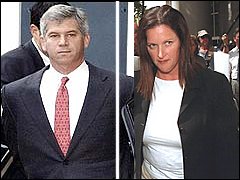 The Chronicle’s Mary Flood reports that Lea Fastow — who served a longer sentence under harsher conditions because of her marriage to former Enron CFO Andrew Fastow — was released to a halfway house from the Federal Detention Center in downtown Houston today. She is scheduled to be released from the halfway house on July 11.
The Chronicle’s Mary Flood reports that Lea Fastow — who served a longer sentence under harsher conditions because of her marriage to former Enron CFO Andrew Fastow — was released to a halfway house from the Federal Detention Center in downtown Houston today. She is scheduled to be released from the halfway house on July 11.
Although U.S. District Judge David Hittner’s handling of the Lea Fastow case has received the most media attention, the case is really a prime example of the Enron Task Force’s lack of prosecutorial discretion and heavy-handed plea bargaining tactics.
In reality, Judge Hittner simply never appeared comfortable with the Task Force’s indictment of Mrs. Fastow. The indictment was a blatant move to place pressure on Mr. Fastow to cop a plea and cooperate with the prosecution, which he eventually did.
During Mrs. Fastow’s sentencing, Judge Hittner harshly criticized prosecutors for vacillating between an original indictment of six felonies and a final charge of just one misdemeanor, suggesting that justice may not have been served in either instance.
“Such maneuvering as is present in this case might be seen as a blatant manipulation of the justice system,” Judge Hittner stated on the record.
Yale law professor John Langbein, who has written extensively regarding prosecutorial abuse of the American plea bargaining system, identifies the problem in the following manner:
“Plea bargaining concentrates effective control of criminal procedure in the hands of a single officer. Our formal law of trial envisages a division of responsibility. We expect the prosecutor to make the charging decision, the judge and especially the jury to adjudicate, and the judge to set the sentence. Plea bargaining merges these accusatory, determinative, and sanctional phases of procedure in the hands of the prosecutor.
Students of the history of the law of torture are reminded that the great psychological fallacy of the European inquisitorial procedure of that time was that it concentrated in the investigating magistrate the powers of accusation, investigation, torture and condemnation. The single inquisitor who wielded those powers needed to have what one recent historian has called ‘superhuman capabilities [in order to] keep himself in his decisional function free from the predisposing influences of his own instigating and investigating activity.
I cannot emphasize too strongly how dangerous this concentration of prosecutorial power can be. The modern prosecutor commands the vast resources of the state for gathering and generating accusing evidence. We allowed him this power in large part because the criminal trial interpose the safeguard of adjudication against the danger that he might bring those resources to bear against an innocent citizen — whether on account of honest error, arbitrariness, or worse.

Great website!
The tremendous power of prosecutors to GENERATE ACCUSING EVIDENCE is what every single one of us needs to pay attention to and I’m glad we are starting to speak publicly about it. It is a frightening power and is in the hands of people who are so mired in their own self interest and self-promotion that they have lost sight of the fact that they are damaging and imprisoning decent people who have no intent to commit crimes, no resources to fight back and most don’t even understand how to fight back especially against “generated evidence” through the plea bargain control and the absolute power to prosecute or not. I’m not talking about the multi millionaires since they usually start with the easier prey- the low and mid level employees- but we have to remember that multi millionaires are people too. By the way–when did the government start painting AA employees as the pitied victims of their large-fee-paying-clients rather than as the big bad criminal defendants themselves? When they started playing ball with the prosecution of course. Making sure to convict someone else is the surest and easiest path to freedom!
On the exposure of the wealthy to threat of wrongful conviction, consider the words of
Paul Craig Roberts, a senior fellow at the Hoover Institution, former editor and columnist of the Wall Street Journal and former Business Week columnist, in his ?The Causes of Wrongful Conviction,? The Independent Review, Vol. VII, No. 4 (Spring 2003) 567, 567-68;
“The older Marxist view that justice is a function of the size of the pocketbook ? the rich get it and the poor don?t ? has no credibility in our time of asset freezes and prosecutors in search of high-profile cases. [?] It is easier to frame a white-collar defendant than to frame a poor member of a minority group. The common-law crimes associated with the poor ? theft, assault, murder ? are well defined. Frame-ups for such crimes require prosecutors to suborn perjury, suppress exculpatory evidence, and coerce false confessions. To frame a white-collar victim, a prosecutor need only interpret an arcane regulation differently or with a new slant.”